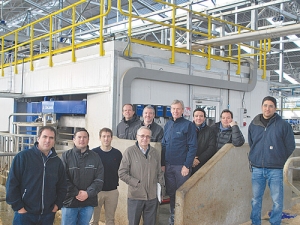NZ kiwifruit holding ground in global markets
The fight for global customers by fruit producers and marketers is on.
 Staff at Fundo El Risquillo, a large farm in Chile are eagerly awaiting the installation of 64 DeLaval VMS milking robots, making it the world’s largest robotic milking farm.
Staff at Fundo El Risquillo, a large farm in Chile are eagerly awaiting the installation of 64 DeLaval VMS milking robots, making it the world’s largest robotic milking farm.
A 6500-head dairy farm in Chile will become the world's largest robotic dairy after signing an agreement to install 64 DeLaval VMS milking robots.
The farm, owned by AgrÌcola Ancali and part of the Bethia Group, already has 16 DeLaval VMS installed and averages 45.2 litres for the 920 cows going through the robotic milking system.
Ancali AgrÌcola chief executive, Pedro Heller, says the expansion follows good results from first stage of the robotic dairy.
"We started using robots for 500 cows, and when we saw the economic benefits and we realised that it was possible to improve production per cow by 10% and reduce the stress of the cow so we decided to further explore," he says.
"During the second stage we decided to modify the farm, changing our conventional milking system for an automatic milking system.
"The plan is to have our best 4500 cows milked by DeLaval VMS and we believe we have a perfect set up should we decide to grow more in the future."
The farm also includes a ventilation system, cow cooling, rubber flooring, swinging cow brushes, water troughs and illumination.
When the new installation is complete, 4500 cows will be milked robotically while one rotary will remain for fresh and special needs cows. There are currently four rotaries in operation today.
The first DeLaval VMS installation took place with eight milking robots in October 2014. By early 2017, 64 DeLaval VMSs will be installed making the farm the largest robotic milking farm in the world.
The El Fundo Risquillo farm is located 500km south of Santiago and is part of a larger operation including a beef farming operation and a stud farm.
Environment Southland is welcoming this week’s decision by the Environmental Protection Authority (EPA) to approve the release of Blaptea elguetai, a leaf‑feeding beetle that will help control the highly invasive Chilean flame creeper.
This March, the potato industry is proudly celebrating International Women’s Day on 8 March alongside the International Year of the Woman Farmer, recognising the vital role women play across every part of the sector — from paddocks and packhouses to research, leadership, and innovation.
Fruit trader Seeka posted a record profit and returns to shareholders in 2025.
Recent weather events in the Bay of Plenty, Gisborne/Tairawhiti, and Canterbury have been declared a medium-scale adverse event.
DairyNZ's chief executive Campbell Parker says the 2024/25 dairy season reinforces the importance of the dairy sector to New Zealand.
A New Zealand agribusiness helping to turn a long-standing animal welfare and waste issue into a high-value protein stream has won the Australian dairy sector's top innovator award.